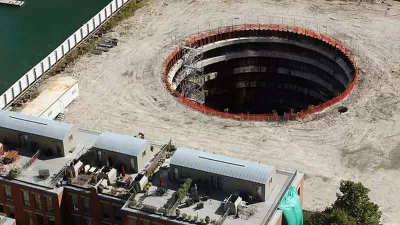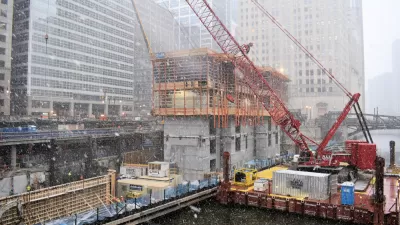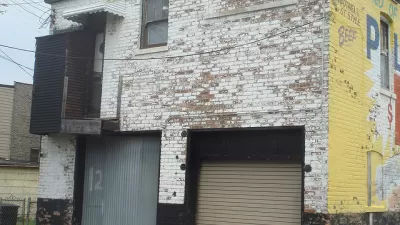Developers Related Midwest have new plans for the infamously failed development site, but have so far been stymied by demands from the office of Alderman Brendan Reilly.

Blair Kamin does not mince words in when describing the causes of a recent decision by an alderman in Chicago regarding the long-languishing former planned location of the Chicago Spire:
In rejecting developer Related Midwest’s proposal for the former Chicago Spire site at 400 N. Lake Shore Drive, Ald. Brendan Reilly, 42nd, is kowtowing to the NIMBY instincts of his constituents, who clearly don’t want the world streaming through their high-rent backyard.
The impact of the decision spreads to the Cityfront Center, which Kamin recently documented in a feature-length interactive story that serves as a cautionary tale about mega-project planning.
In the case of the former Spire site, the project would have further the incomplete goals of the city's master plan for the Cityfront Center to leverage private development for the benefit of public open space. "The developers even pledged $10 million to help build the long-stalled DuSable Park," according to Kamin.
In fact, reports Kamin, the concerns of the constituents, as represented by the actions of Alderman Reilly seem to be in making the public space around the building less open. According to Kamin, "in an email to constituents Monday, Reilly announced that the plan “remains stalled” and will stay that way until Related Midwest responds to a list of concerns from neighbors, including this absurd pair: Get rid of the proposed public esplanade along the Ogden Slip and develop a “security plan” for the Riverwalk and DuSable Park."
FULL STORY: So much for those smart plans for the Chicago Spire site. They're falling victim to Reilly's NIMBY cave-in.

Maui's Vacation Rental Debate Turns Ugly
Verbal attacks, misinformation campaigns and fistfights plague a high-stakes debate to convert thousands of vacation rentals into long-term housing.

Planetizen Federal Action Tracker
A weekly monitor of how Trump’s orders and actions are impacting planners and planning in America.

San Francisco Suspends Traffic Calming Amidst Record Deaths
Citing “a challenging fiscal landscape,” the city will cease the program on the heels of 42 traffic deaths, including 24 pedestrians.

Defunct Pittsburgh Power Plant to Become Residential Tower
A decommissioned steam heat plant will be redeveloped into almost 100 affordable housing units.

Trump Prompts Restructuring of Transportation Research Board in “Unprecedented Overreach”
The TRB has eliminated more than half of its committees including those focused on climate, equity, and cities.

Amtrak Rolls Out New Orleans to Alabama “Mardi Gras” Train
The new service will operate morning and evening departures between Mobile and New Orleans.
Urban Design for Planners 1: Software Tools
This six-course series explores essential urban design concepts using open source software and equips planners with the tools they need to participate fully in the urban design process.
Planning for Universal Design
Learn the tools for implementing Universal Design in planning regulations.
Heyer Gruel & Associates PA
JM Goldson LLC
Custer County Colorado
City of Camden Redevelopment Agency
City of Astoria
Transportation Research & Education Center (TREC) at Portland State University
Jefferson Parish Government
Camden Redevelopment Agency
City of Claremont





























